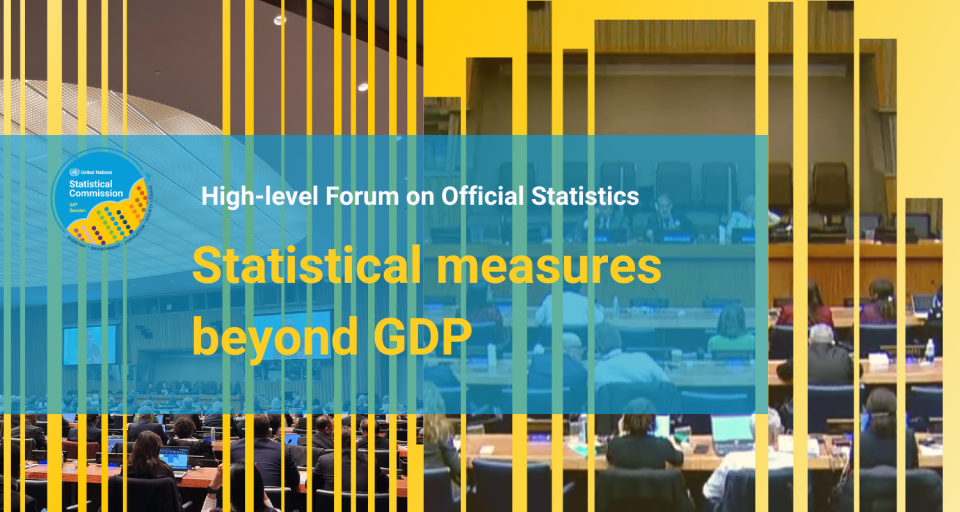Beyond GDP: the SEEA contributions as a statistical framework

Statistical Measures Beyond GDP was the topic of this year High-level Forum on Official Statistics, organized every year at the margins of the UN Statistical Commission. The demand for measures that go Beyond GDP, that is that go beyond the measurement of economic performance of countries and take into consideration people’s well-being and sustainability of the environment, making explicit the contribution of nature to our well-being has risen in the recent years. The Secretary-General of the United Nations, in Our Common Agenda called for new measures of progress to complement GDP and acknowledged the role of the SEEA in “transforming the way in how we view and value nature. We will no longer be heedlessly allowing environmental destruction and degradation to be considered economic progress”.
The event was opened by Ambassador P Csaba Kőrösi, President of the General Assembly of the United Nations, followed by a setting the scene presentation by Mr. Stefan Schweinfest, Director of the UN Statistics Division and two panels one focusing on the users demand, moderated by Ms. Haishan Fu, Chief Statistician and Director of the Data Group, World Bank and the other on the producers response to the users demands, moderated by Mr. Schweinfest.
Ambassador Kőrösi emphasized the role of the UN Statistical Commission to develop methodologies for measures beyond GDP that integrate human, social and natural capital.
Mr. Schweinfest stressed the success of GDP, being a universally accepted measure of economic performance compiled by every country. He recognized that while GDP is a good indicator for what it was intended to measure, it does not measure a lot of things that are important for our well being and thus needs to be complemented with additional measures. The SDG 17.19 already mentions “by 2023 build on existing initiatives to develop measurements of progress on sustainable development that complement GDP, and support statistical capacity building in developing countries”, with the SEEA being one of these initiatives. The UN Secretary-General called for a stocktaking exercise of activities within the UN system summarized in the paper Valuing What Counts: United Nations System Wide Contribution to the Beyond Gross Domestic Product. The paper recommended to develop a dashboard of indicators which needs to build on a political framework that articulates what we mean with terms such as sustainable development, well-being and progress. The UN Secretary-General will issue a policy brief shortly which will feed into the SDG Summit and the Summit of the Future in 2024.
The first panel moderated by Ms. Fu identified the users demand for measures beyond GDP.
Mr. Jed Kolko, Under Secretary of Commerce for Economic Affairs of the United States, presented the US strategy on natural capital and environment statistics. In particular, he highlighted that the data to measure the economy are disconnected from the data on natural capital. The SEEA is an important contribution of the statistical community to get more complete measures of economic activity taking into consideration the contribution of nature and the impacts on the environment. Although this work has been going on for some time, the time is right to embark on NCA considering the climate and biodiversity crises, the demands from the private sector to better account for the environment following the public sector's example, the existence of statistical standards and better coordination within the government.
Ambassador Luteru, Ambassador of Samoa to the United Nations, presented the Multidimensional Vulnerability Index (MVI), which was developed outside the statistical community, led by the Small Island Development States (SIDS) to better reflect their vulnerability to climate change and provide a measure to help access concessional funding.
Mr. Gabriel Yorio, Deputy Minister of Finance and Public Credit, Ministry of Finance, Mexico highlighted the importance of taking into account the social costs of economic decisions and better manage the budget allocation to better manage environmental as well as cultural assets.
The second panel moderated by Mr. Schweinfest highlighted activities that the global statistical community is already undertaking to provide the statistical framework to go beyond GDP.
Ms. Mariana Kotseva, Director-General of Eurostat stressed that GDP already measures many elements of well being and sustainability. The on-going update of the System of National Accounts further expands the coverage of these measures. Moreover, the SEEA provides the conceptual framework to measure the environment and its relationship with the economy allowing to measure sustainability and fully go beyond GDP. In fact, many of the SDGs can be derived directly from the SEEA and there is no need to compile additional data. Ms. Kotseva recognized the success of the statistical community in developing the SEEA in the past years. Nevertheless, she highlighted that the SEEA is underutilized and stressed the need to do more to communicate what the SEEA can offer. The Beyond GDP initiative presents an opportunity to advocate for the SEEA. Further, she noted that the EU has a number of dashboards to respond to different users demand (e.g. dashboard on circular economy, on climate change, etc.) and a proliferation of dashboards is not a bad thing as long as the indicators are derived from a common conceptual framework and are a way of disseminating regularly compiled data in a format that meets users demand. Rather than developing yet another list of indicators we should focus our efforts in implementing what we have developed.
Mr. Anil Arora, Chief Statistician of Canada, highlighted that GDP measures the output of economic activity but does not give a qualitative assessment of whether the output is good or bad and who are the winners and losers. Considering the wide range of different aspects that need to be measured, it is not surprising that the recommendation is to develop a dashboard of indicators. Mr. Arora stressed the importance of working together with the policy makers from the outset to define the measurement framework of beyond GDP. NSOs should step up and grab the opportunity to develop an agile framework.
